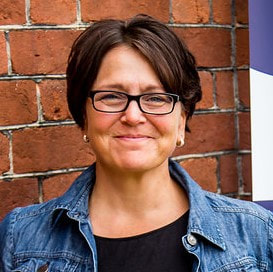-
 Katharine Tyler (PI) University of Exeter
Katharine Tyler (PI) University of Exeter -
 Cathrine Degnen Newcastle University
Cathrine Degnen Newcastle University -
 Susan Banducci University of Exeter
Susan Banducci University of Exeter -
 Dan Stevens University of Exeter
Dan Stevens University of Exeter -
 Travis Coan University of Exeter
Travis Coan University of Exeter -
 Laszlo Horvath University of Exeter
Laszlo Horvath University of Exeter -
 Joshua Blamire University of Exeter
Joshua Blamire University of Exeter
Dr. Katharine Tyler
Associate Professor in Social Anthropology, University of Exeter
K.Tyler@exeter.ac.uk
I am the project’s principal investigator. I am an Associate Professor in Social Anthropology in the Department of Sociology, Philosophy and Anthropology at the University of Exeter. My work is founded upon reflexive, multi-sited, residential ethnographic fieldwork within urban, suburban and semi-rural locales of Britain. I have published articles and books on the following themes: conviviality and racism; whiteness and social class; the idea of the English village as a classed and racialised space; the formation of interracial (mixed-race) identities; race and genetic technologies; ethnicity, the state and collective action; Englishness, whiteness and the legacies of Empire; the anthropology of Britain.
As the project’s principle investigator, I have overall responsibility for the leadership and successful completion of this project. I will also carry out 12 months of ethnographic fieldwork in the South West.
Please get in touch with me if you are interested in learning more, or in taking part in the research.
Katharine’s profile page at Exeter SSIS
Prof. Cathrine Degnen
Professor in Social Anthropology, School of Geography, Newcastle University
cathrine.degnen@ncl.ac.uk
I am one of the three ethnographers working on this project, and a Co-Investigator. My research has first and foremost always been concerned with how people create meaning and make sense of their social worlds in contexts of social transformation. I have built a significant body of work exploring this central interest in two key empirical areas: older age and everyday life, and the anthropology of Britain.
As an anthropologist and ethnographer, all of my research is grounded in a fundamental commitment to the lives of the people I have worked with, and to what matters to them in their everyday experiences. I have published books and journal articles that contribute to shaping debates in contemporary social theory on personhood and on self; on older age and later life; on identity, belonging and social memory; on human and non-human relations; and on the creative affordances of place. On “Identity, Belonging and the Media in Brexit Britain”, I will be conducting 12 months of ethnographic fieldwork in Newcastle and Sunderland, in the north of England. Please get in touch with me if you are interested in learning more, or in taking part in the research.
Cathrine’s profile page at Newcastle School of Geography
Prof. Susan Banducci
Professor of Politics, Director of Q-Step Centre, University of Exeter
s.a.banducci@exeter.ac.uk
I am Professor in Politics and Director of the Nuffield, ESRC and Hefce funded Exeter Q-Step Centre. I have 20 years of experience working on international, collaborative projects including the New Zealand Election Study, the European Election Study and 2 EU funded early career researcher training networks. My recent research on media and electoral behaviour has been supported by the ESRC and British Academy. I am PI on an ESRC NCRM Methodological Innovation grant that examines information exposure in a networked environment focusing on both traditional and social media.
Susan’s profile page at Exeter Q-Step
Prof. Dan Stevens
Politics, College of Social Science and International Relations, University of Exeter
d.p.stevens@exeter.ac.uk
My main interests are in mass political behaviour in the United States and Britain. I look at the major influences on political attitudes and behaviour, such as the economy, political advertising, and the news media. Current projects include ongoing research into perceptions of political advertising, patterns and effects of different forms of mobilization in elections, and the role of leaders in British elections.
Dan’s profile page at Exeter SSIS
Dr. Travis Coan
Senior Lecturer in Politics, Q-Step Centre, University of Exeter
t.coan@exeter.ac.uk
I’m a Lecturer in Quantitative Political Science and an academic staff member at the University of Exeter’s Q-Step Centre. Before joining the Politics Department at Exeter, I was a Statistician and Lecturer on Law at Harvard Law School, where I directed the Empirical Research Services group and taught applied quantitative analysis.
While my research spans a diverse set of topics in political science, my most recent work applies advances in text-mining and natural language processing to examine the relationship between climate change scepticism, public opinion, and environmental policy. My methodological interests include the study of causal inference with experimental and observational data, text analysis, and Bayesian statistics. This work has appeared in International Studies Quarterly, International Interactions, and Political Psychology, among other scientific journals.
Travis’ profile page at Exeter Q-Step
Dr. Laszlo Horvath
Postdoctoral Research Associate, Q-Step Centre, University of Exeter
l.horvath@exeter.ac.uk
My primary responsibility is to collect and analyse traditional and social media data, to map the issue coverage of Brexit and European affairs in the UK.
Laszlo’s profile page at Exeter Q-Step
Dr. Joshua Blamire
Postdoctoral Research Associate, Department of Sociology, Philosophy and Anthropology, University of Exeter
j.blamire@exeter.ac.uk
I am conducting research at two sites in the East Midlands as one of the three ethnographers working on the ‘Brexit and Belonging’ project. My background is in Human Geography and my research is concerned with meaning, identity and belonging within the context of social and political transformation.
Prior to focusing on Brexit, my research explored austerity and anti-austerity politics in Liverpool, and considered the ways in which austerity is being politicised, managed and contested by a wide range of societal actors, such as grassroots ‘anti-austerity’ campaigns, third sector organisations and the city council. Through deep ethnographic engagement that places emphasis on people’s everyday experiences, the research argued that local anti-austerity politics — and the possibilities for alternatives to austerity — are deeply intertwined with the political histories and identities associated with the city.
Josh’s profile page at Exeter SSIS
Website
In case of any technical queries or issues:
-
 Michel Durinx web admin
Michel Durinx web admin